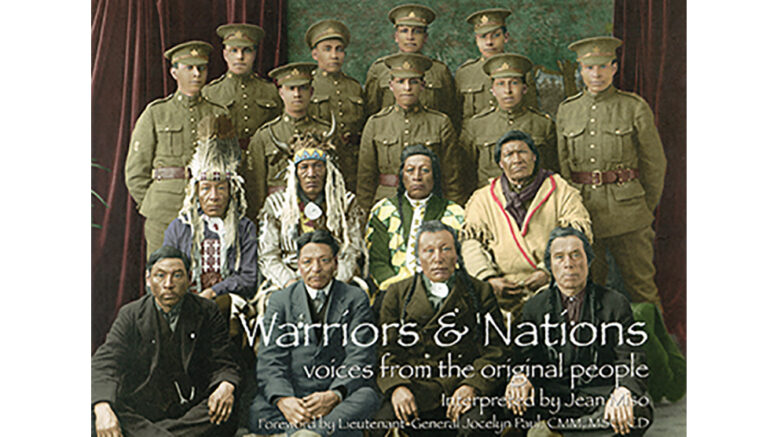By Jeremy Appel, Local Journalism Initiative Reporter
(ANNews) – Author Jean Miso has a new book out, which gathers and chronicles the stories of Indigenous war veterans from coast to coast.
Miso, who isn’t Indigenous, said she was inspired to write about the experiences of Indigenous veterans while writing a previous book about Canadian Ranger Patrol Groups, which conduct search-and-rescue operations in remote areas throughout the country.
The Ontario 3 CRPG is notable for being composed almost entirely of First Nations soldiers.
While researching for the initial book, she was flown in and out of remote Indigenous communities around the James Bay area in central Ontario.
“I saw the situation of their living conditions and felt that we need to draw more attention to support them,” Miso told Alberta Native News.
That’s how her most recent book, Warriors & Nations: Voices from the original people came to be, which the author described as her effort “to help draw attention to the service that was largely put under the carpet so to speak, in past military situations, so as to draw attention to their involvement and sacrifice and service to our country.”
The book is divided into chapters for each province and territory, with each accompanied by artwork from an Indigenous artist based there.
Miso said she began gathering stories prior to the COVID pandemic, when she was able to travel freely to various Indigenous communities throughout the country.
Lieutenant-General Jocelyn Paul, who wrote the book’s forward, helped connect Miso to other Indigenous veterans and encouraged her to write it.
The author set out from northern Ontario, driving to B.C., and then returning through southern Alberta, where the largest reserve in Canada, the Blood Tribe, is located.
Why would an Indigenous person want to serve the very country that attempted to eradicate their culture? That was a question that kept coming up for Miso.
“First of all, they are the caretakers of this land, so they felt that if they didn’t go protect the land that there could potentially be harm down the road. They sense the urgency of service to protect the land and keep what they hold sacred protected,” Miso explained.
Additionally, Indigenous people enlisted for the same reason many other people do – money and a sense of adventure.
According to the book, Indigenous people have served as Canadian soldiers since the British Nile Expedition of 1884 – the first time Canadian troops were sent overseas – with 86 Indigenous men from Quebec, Ontario and Manitoba joining a 367-man force to paddle up the Nile to rescue a trapped group of British soldiers from Sudan.
As a non-Indigenous person, Miso felt an obligation to highlight and honour the sacrifices Indigenous people have made for Canada. But the purpose of Warriors & Nations isn’t solely to profile Indigenous service members. It’s to provide a broader view of the communities they came from.
“I want to show the variation of people and the struggles that they encountered to practice their traditions and follow their spirituality and communicate in their languages,” Miso said.
Many Indigenous communities also showed support for the war effort through fundraising. Some Indian agents turned down the funds, because “they knew the community couldn’t afford it,” Miso said.
Indigenous people, of course, aren’t a monolith. Some Indigenous soldiers enlisted under fake names, “because they knew that they wouldn’t be welcomed back into their community, or be able to go back as an Indigenous person,” she said.
Miso said Indigenous soldiers are one type of warrior. Another are those who help keep their culture alive.
“Within the traditional rich fabric of Indigenous nations,” Miso writes, “I have observed that the role of a warrior encompasses much more than combat. Indigenous men and women are selected to become guardians of all aspects of community knowledge … These experts protect information and guide their people according to ancient wisdom.”
All proceeds from sales of Warriors & Nations will go towards groups working on the preservation of Indigenous monuments and Indigenous education initiatives.
Proceeds from sales of Miso’s previous books have also gone to charity, including building a home for unhoused veterans in London, Ont., the Royal Canadian Legion Poppy Fund, and the Toronto Council Fire Native Cultural Centre.
“I can’t help everybody, but you have to have belief in the power of one that you can make a difference in someone’s life and work towards it,” Miso said. “That’s basically my philosophy.”



Be the first to comment on "New book honours Indigenous war veterans"